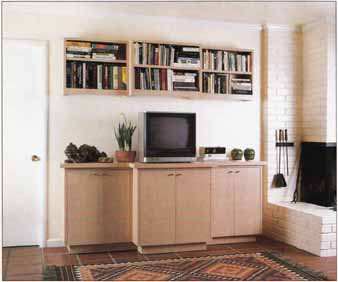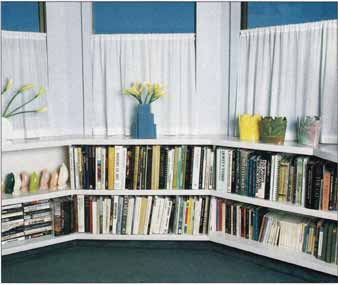The dimensions of a case depend on the space available. Look closely at the room. Is there unused wall space? Is there a place for a freestanding unit?
Matching what exists
The best design echoes already existing lines. For example, a bookcase consistent with the height of windows or doors looks as if it belongs in the room. Positioning shelves along the same plane as the height of a table or at the same level as a sofa arm relates them to the furnishings. Building cabinets around a radiator disguises or at least deemphasizes it. But don’t enclose a radiator, or you will end up with a hot cabinet and a cold room!
Practicality
Don’t build shelves that you are unable to reach or ones that force you to stoop awkwardly when you retrieve objects or put them away. Remember that even though you might be able to reach a high shelf, you will only be able to see the larger items on the shelf. Small items will be out of sight. Consider putting drawers or slide-out shelves inside low cabinets to in crease convenience.
Cases should be accessible and should allow access to heat vents, light switches, electrical outlets, and pieces of furniture.
Think ahead, plan on paper, and experiment by positioning large cardboard boxes in the location pro posed for a case. Do not place a bookcase or cabinet in a spot where it will be bumped every time someone enters the room.

Always consider the placement before starting to build. Here the
cabinets and the shelves that float above them are sized to fit between
door and fireplace.

To avoid ugly sagging, heavy magazines, books, or records should
never be arranged on shelves that are more than 30 inches wide unless the
shelves are strengthened or supported.
Assessing the storage
What are you planning to put on the shelves or inside the compartments? Art books? Paperbacks? Children’s toys? Stereo equipment? A television? Answering these questions will enable you to determine how deep the shelves must be, how far apart they should be, and how strong they need to be.
Later we will show you how to construct special features, such as a wine rack, slide-out TV shelf, sewing center, and computer area. You can build these features into almost any bookcase or cabinet, thereby customizing the structure to suit all of your particular needs.
If the case is intended for storage, measure the items you want to accommodate. It may not bother you that your record albums (12½ inches square) will stick out beyond the edge of an 11½-inch shelf, but you should know this before building.
Prev.: Making
Plans:
Selecting a Style
Next: Plotting
Moves:
Materials
Full guide: How to Plan & Build Bookcases, Cabinets & Shelves
